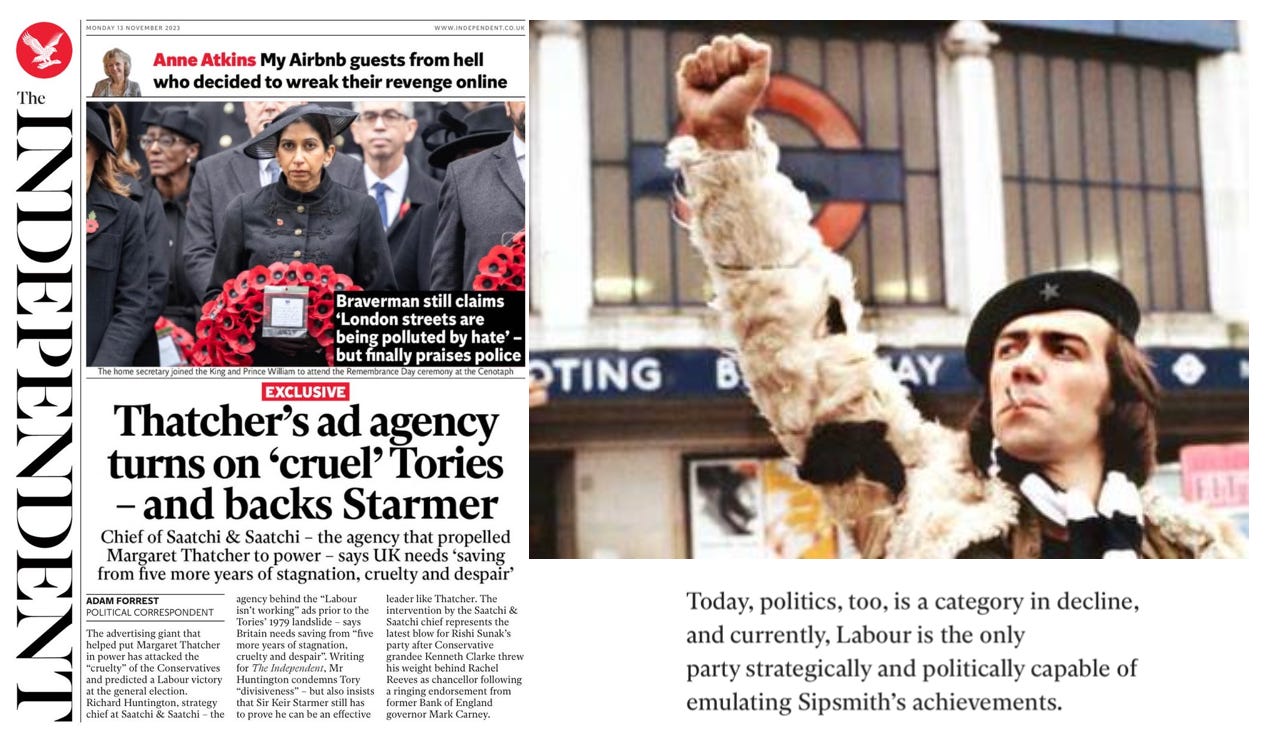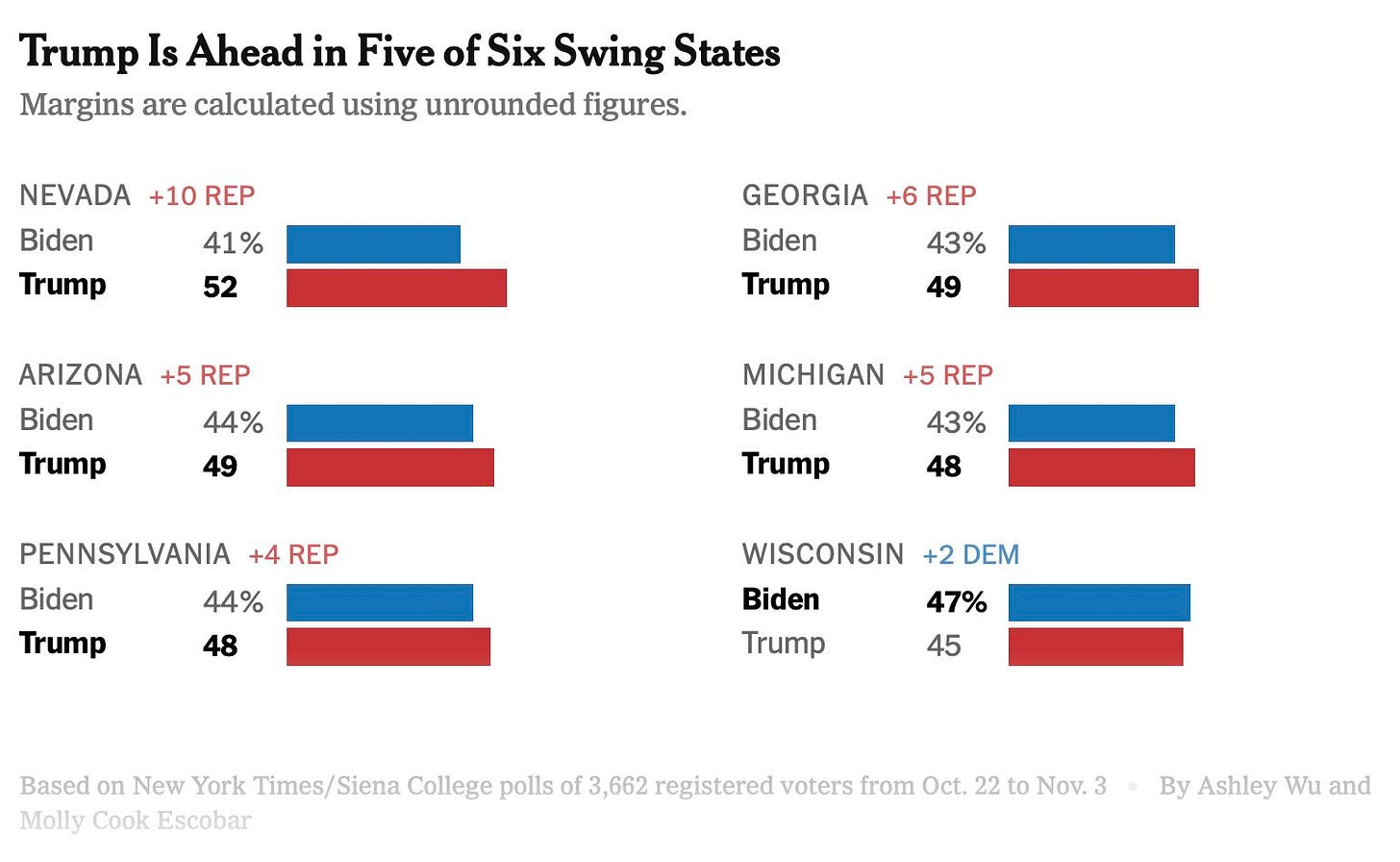Dispatches from the pre-post-purpose age
A round-up of recent thoughts on politics, purpose and Christmas ads. Plus a book announcement and request.
Not an essay-style post this time, but an assortment of thoughts that I’ve shared on LinkedIn and Twitter of late, some of which have gone down better than usual.
But first, an announcement: I’ve committed to writing a book on purpose, tentatively titled The Road to Hell. It builds on the three-part essay and Q&A that I posted earlier this year, but it’ll go into greater depth and pull together everything I’ve learned from the deep dive into purpose that I embarked on some time in 2017.
I’d like to get it into the world in the first half of next year, and I don’t feel I can make that happen through a big publisher, even if one was interested. There are ways and means to do these things yourself, but I’d welcome any interest from independent publishers. If any of you have any leads or advice, please reply to this email and let me know.
OK, now some of the recent thoughts.
1. Jung Lewis
Watching the John Lewis and Morrisons Christmas ads, I was struck by the visual parallel between the Venus flytrap and the Morrisons singing oven glove. It sent me off into thoughts of Jung and the pre-post-purpose age. I meant it both in jest and in earnest—whole thing is below and on LinkedIn and Twitter.
Here is the Jungian reading of the John Lewis ad that you know you need.
The Venus flytrap is consumer capitalism. By the end, it is vomiting out presents to an acquisitive family who were queasy about allowing it into the house, and now feel guilty about shoving it out into the cold (but not sufficiently guilty to bring it back in again).
The family is the 2023 ad industry, awkwardly re-embracing the commercial purpose it has neglected for so long, while keeping it at a safe distance from the warm, cosy mental comfort zone of social purpose.
The gift of the Venus flytrap comes from the boy (Gen Z) looking beyond his parental generation (including the absent father, who represents the lost creative force) and appealing instead to his Gran, who is Bill Bernbach. The result is a re-embracing of advertising's role in driving growth that appears scary and ugly on the surface, but also gives us many things we want, including Lego Minecraft.
Meanwhile, there is a visual echo between the John Lewis flytrap and the Morrisons oven glove, which is no coincidence as both emerge from the collective unconscious of our times.
The Morrisons oven glove represents the lower middle class’s functional relationship with consumption. The glove is protective and utilitarian, the music is cheerful, the faces and superficial identities of the cast are largely hidden and unimportant, the message is one of solidarity as the cat (representing individualism) paws at the window.
The John Lewis flytrap represents the upper middle class's dysfunctional relationship with consumerism, wanting its rewards but afraid it is a monster that will ultimately consume them (or their dog, who represents familial bonds). The music is both highbrow and anxiously frenetic.
Finally, the John Lewis and Marks & Spencer ads are built on a similar 'insight' involving a strained combination of respecting tradition but also you-do-you. We are stuck between an uneasy relationship with our past, and uncertainty about the future. Morrisons has the answer: We can build this dream together, standing strong forever, nothing's gonna stop us now.
We are entering the pre-post-purpose age and the ad industry is dreaming fitfully about its future. Things may eventually improve, but will also continue to be weird.
2. Other Christmas thoughts
I had some further thoughts on Waitrose, Marks & Spencer and Morrisons, which you can read here.
For now, I’ll say that I think the Morrisons ad is excellent—a welcome example of adland producing great, populist, stupidly likeable ads. No celebrity, no piano cover versions, no big budget effects, just a relatable, relevant, funny idea.
And I think the Etsy campaign is great too—all about the annual mission impossible of finding the right gifts for tricky people. See more in the campaign here.
While Marks and Spencer and John Lewis strain to say big things about doing your own thing, but also doing tradition, Etsy and Morrisons feel comfortable in their own skin. They’re great, creative, commercially relevant ideas that could have been made any time in the last few decades—that’s a hard thing to do.
3. Citizen Sipsmith
One sign we’re in the pre-post-purpose age is that adland is starting to talk about things beyond purpose—even weird things like government and democracy. There was an interesting article in the Independent this week, which I wrote about below—it led to conversations on Twitter and LinkedIn.
Interesting to see Saatchi & Saatchi Chief Strategy Officer Richard Huntington writing in The Independent about reinventing the ‘category’ of government, taking Sipsmith’s reinvention of the gin category as an example.
Nothing against Huntington himself, who is at least engaging thoughtfully on all this stuff, but it feels anachronistic to see the opinions of any ad person given this kind of weight (‘the latest blow to Sunak’??), especially when ‘ad person leans left’ is not a surprising story these days. It says something about the power of branding that Saatchi’s can still trade off the name, even long after M&C left the building.
As for the substance of the article, I can imagine it’s true that people have less faith in the power of government to change anything meaningful, but I’d be interested to see evidence for it rather than assertion. On the surface, there’s a contradiction between saying we no longer believe government has the power to deliver change AND to say the Conservative government has been actively making life worse through austerity economics, climate policy or managing the Covid outbreak. It’s one or the other.
Predictably, what interests me most is how adland is now stepping up to rebrand the ‘category’ of government, having spent the past decade expanding the category of corporate power into politics—through our old friend Purpose. Maybe we’re finally realising that the public isn’t buying this narrative and social change was never going to be enacted through purposeful brands.
If adland wants to play a role in changing perceptions, it could do worse than dropping the purpose agenda and reminding people that corporations are a different ‘category’ to government. Rather than stepping up to fill the imaginary void, corporations could step back and respect the political freedoms of individuals over the imposed values of boardrooms.
And if this new post-purpose, pro-democracy movement needs a slogan, the original Citizen Smith can provide one: Power to the people!
4. Gen Z is refusing to be what marketers want it to be
Meanwhile in the US, the polls aren’t looking too cheerful. The New York Times published one that I write about below, and it’s been followed by another prediction of Trump victory from Politico.
I don’t take the polls as predictions of the election results—a lot can happen in a year, and polls can be wayward in any case. But from a marketing point of view, my main interest was in what they say about Gen Z and its supposed unanimity about purpose and progressive causes—something corporations often claim as justification for pushing their own agendas. Here’s what I wrote on Twitter and LinkedIn.
The new wave of Gen Z consumers is refusing to be what purposeful marketers want it to be.
The latest New York Times / Siena poll shows Trump ahead in five of the six states that will swing the next election—based on a survey of 3,662 voters drawn from diverse backgrounds.
And it’s the 18-29 year old results that most interest me.
“More than any other generation, Gen Z collectively demands purpose and accountability” says McKinsey.
46% of 18-29 year olds would vote for Trump if the election was held today, only one percentage point behind Biden, says the poll.
“Gen Z is repurposing with purpose” says Ernst & Young.
The 18-29-year-old vote rises to 51% if the candidate was Kamala Harris. But still 42% of this purposeful generation would vote Trump, says the poll.
“To win the hearts of Generation Z, companies and employers will need to highlight their efforts to be good global citizens” says Deloitte.
62% of 18-29 year olds rank economic issues, such as jobs, taxes and cost of living, as most important to them. Only 29% choose societal issues including abortion, guns and democracy, says the poll.
“I think that the increasing movement towards thinking of art as a form of activism… is part of a wider sense of purpose… across the whole higher education sector…the momentum for that comes from the students.” says the Chief Social Purpose officer at UAL.
Meanwhile, a UK poll (Opinium, sample of 2000) at the start of the Ukraine war said 81% of over-55s thought brands should stop doing business in Russia, but only 33% of 18-34 year olds. Similarly, only 15% of all adults wanted brands to reflect the crisis in their advertising campaigns, and that number fell to 11% among 18-34 year olds.
You can lament all of the above—I lament much of it. And on the level of personal politics, US readers might want to push for change, such as finding an alternative candidate to Biden. But as marketers, all this should be taken as evidence that Gen Z is far more complex than the narrative that management consultancies and purpose leaders want to impose on them, as a way to justify what is really a top-down movement to give corporate power a more acceptable face.
Republicans buy sneakers too, said Michael Jordan. Like it or not, Republicans are 46% of the Gen Z market.
5. A few other quick reads
Uber, trains and ‘Mock the Week’ copywriting
The wrong reason for advertising’s decline
Conversation with a purpose advocate
(see comments thread for a useful conversation about purpose and ‘conviction’)
And an unscientific survey relating to my last post titled Purpose is temporary; creativity is permanent. I don’t read much into the results, but it’s at least heartening to see many people are willing and able to make that pragmatic distinction between creative judgment and ethical/political preoccupations. Follow the links for the LinkedIn poll and Twitter poll.
6. Finding purpose outside work
Finally, I had a great conversation with writer and musician Kate van der Borgh, ostensibly about our latest musical collaboration (a song called I delight in you—see above), but more broadly about purpose, and how so many people find purpose outside work, rather than within it. Here’s the full conversation.
Thanks for reading. For anyone new here, I’m a writer of poetry, downbeat diaries, branding and advertising projects, articles for Creative Review and The Guardian, books about design, and occasional songs. Thoughts on Writing uses language as a way into wider cultural and political issues.





